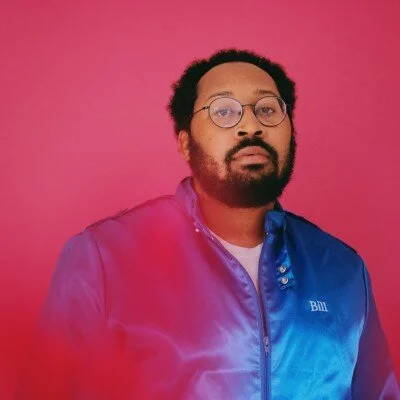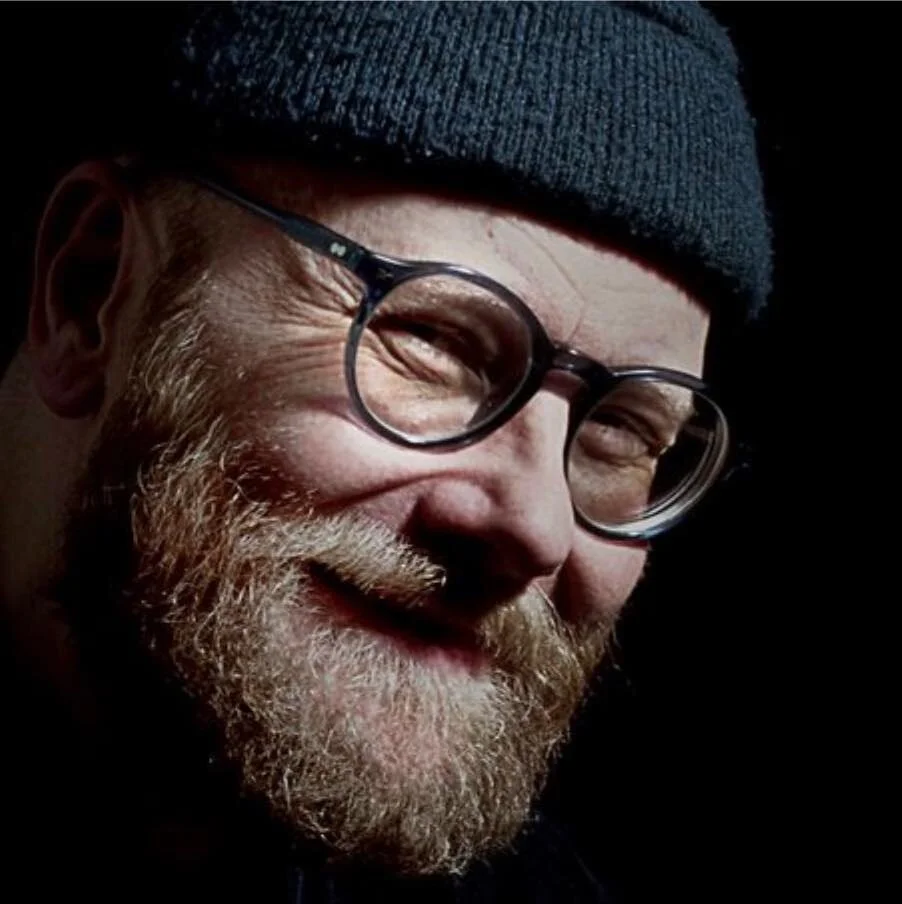Whether he’s longboarding or reading to his kids or drawing, Bardo Martinez of Chicano Batman is always thinking about his next song.
Read MoreThere are days when the songs just won’t stop coming, says Bartees Strange. His job as an artist is to stand there and try to catch all those ideas. “It’s like holding a bucket outside in the rain,” he says.
Read More“I do a dream journal in the morning on an old IBM Selectric typewriter, then an evening journal on a 1983 Apple IIe computer. ”
Mike Doughty believes that old-school discipline is a necessary component of the songwriting process.
Read MoreRobyn Hitchcock has been writing songs since the 1970s, both solo and with acts like the Soft Boys and Robyn Hitchcock and the Egyptians. He's earned praise and adulation from critics and songwriters the entire time. Like most songwriters with long careers, he writes constantly. Some of his writings become songs, some don't, although he hates journal writing. Hitchcock likes to write in the morning when his mind is fresh, but he admits that a hangover can be a good tonic for songwriting (something many other songwriters have mentioned to me). This would appear to be counterintuitive; after all, how can you write when you're in pain? But it's precisely that discomfort that Hitchcock finds so stimulating.
Read MoreJessica Lea Mayfield owns a blue tote bag. This in itself is not unusual: you probably have a tote bag too. But it’s not a stretch to say that Mayfield’s blue tote bag is her life. It contains almost everything she’s ever written, all the way back to when she was a child. There are scraps of notebook paper, receipts, utility bills, pieces of cardboard. And she’s written on them in pens, pencils, eyeliner, and crayons, among other things. Whenever Mayfield has a thought, she writes it down and puts it in the bag. And when it comes time to write a song, she will often dump the bag’s content all over the floor and search for an idea or a verse or phrase that fits the melody for the song she’s writing.
Read More
You know Dan Wilson. You may not think you know Dan Wilson, but you know Dan Wilson. How do I know that you know Dan Wilson? Because it's closing time somewhere in the world as I'm typing this and as you're reading this, and there is no way in hell that you haven't heard that song. Which, by the way, I still love.
You also know Dan Wilson because you know Adele and the Dixie Chicks. He co-wrote Adele's "Someone Like You" and the Dixie Chicks' "Not Ready to Make Nice." He won two Grammys in 2007: Song of the Year as co-writer on "Not Ready to Make Nice" and Album of the Year for the Dixie Chicks' album Taking the Long Way. He again won an Album of the Year Grammy in 2012 for Adele's album 21. The list of artists he's either written with or produced is dizzying: Taylor Swift, Nas, Pink, Weezer, John Legend, Josh Groban, Chris Stapleton, Spoon, Preservation Hall Jazz Band, My Morning Jacket, to name a very small few. He's got indie street cred too: he worked extensively on Phantogram's 2016 album Three, including a co-writing credit on every song except one.
Read MoreMany people believe that words flow effortlessly from the pens of great writers. These writers, people think, can just sit down and churn out page after page of prose, poetry, or whatever it is they are writing. But this is fantasy. Good writing is hard. Heck, if it were easy, the world would be filled with great writers.
For most of us, writing can be a struggle. Dallas Green, who writes and records under the name City and Colour, told me that since his last album If I Should Go Before You in 2015, he's only written a handful of songs, an unusually low number for him. Green is, by his own admission, a slow writer anyway, due to partly to fear. "I've always had this fear that I'm so scared to write the wrong thing down, even though the only way to get to the right thing is to first write the wrong thing down. And it's a real problem because I keep everything up in my head until I feel like I've got it. It's almost like I'm afraid to force it, so I never force it. That really slows my process," he told me when we talked. But while he thinks often about why the words have been slow in coming, I didn't get the sense that he's too concerned. He recently took two months off from music, and while he imagined that he'd writing something during that time, he didn't. "I'm comfortable not feeling the need to get in the studio," he said.
Read More"You can't have purple prose and expect people to get to the core on their own," Kristin Welchez told me as we discussed her songwriting process. Welchez is the leader of the Dum Dum Girls with a new project under the moniker Kristin Kontrol. Welchez told me that she's always been "indulgent" in her words (it's feedback she's gotten since grade school) but that she tries to be as direct as possible in her songwriting. Stripping an idea to its bare essentials is the easiest way to minimize distance between you and the audience; it doesn't matter whether they're readers or concertgoers. To reinforce this idea to a young Welchez, one of her English teachers gave her a copy of the book Writing Down the Bones, and she's tried to follow this precept ever since.
Read MoreIt's great paradox, right? Sadie Dupuis, songwriter and frontperson for Speedy Ortiz, has an MFA in poetry from the University of Massachusetts. She's been writing poetry for several years. Yet she insists on writing her song lyrics in prose form. They look like paragraphs. She even hates when anyone writing about her music transcribes her lyrics in verse form. "It really does drive me crazy when I see my lyrics reprinted in stanza form. I mean, I'm giving it to them right here. This is the way it should look!"
But it should come as little surprise that Dupuis treats song lyrics this way: her poetry writing and song writing have nothing in common. Her poems start with words and with an idea she'd like to write about, but her songs almost always start with a melody. Sitting down to write poetry and instead coming up with a song "would almost be as if someone sat down to create an oil painting and wound up choreographing a ballet instead," she told me.
Read MorePut Bethany Cosentino of Best Coast in a hotel bathroom, and she's one happy songwriter. If you're with her and she's in there for a looong time, don't worry. She's creating. Music.
The traveling ways of the songwriter dictate that they can't be too picky with their environment when it comes to writing. They have to adapt to their surroundings and write whenever they can, wherever they can. But according to Cosentino, environment plays a "huge" role in her songwriting process. When she's at home, she writes in her "music room," which contains nothing but music related stuff, from guitars to CDs to posters. She loves to write there because the room's solitude gives her privacy. "I try on tour to write, but the problem is that I don't want people to hear me when I'm trying to write. I like to be able to make mistakes and sing badly and play really bad chords that don't sound good together. It's a very private process for me that I enjoy doing entirely on my own. A place like that is hard to find on tour."
Read MoreOh, to be a young and single songwriter. There are no limits to your creative process: without family commitments, you can write anywhere, anytime. And that's what Ben Bridwell, singer and songwriter for Band of Horses, did. He went to cabins and cabooses, from mountains to ocean shores. Bridwell craves that isolation to write, and he thought it was a necessary component to his process. And that isolation, he believed, couldn't be a quiet room in the house. It had to be far away. (Not all songwriters need solitude, though; many have told me that they prefer to be around at least a little bit of action. There's Cory Branan, who wrote his first two albums in a mall food court. And there's Rhett Miller, who likes venue stairwells, where it's quiet but he not too far from the hustle and bustle of load in.)
Three daughters and a wife later, Bridwell can no longer pack up his notebooks and head to the hills to write like he used to. He's got a family now. But he's found the perfect space: his garage-cum-studio. No one bothers him there, though admittedly they stay away for more practical reasons: according to Bridwell, "it's dark and there are lots of bugs." Having this space made Bridwell realize that it's solitude that matters, not where the solitude is.
Read More











